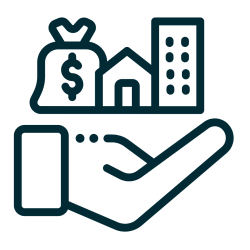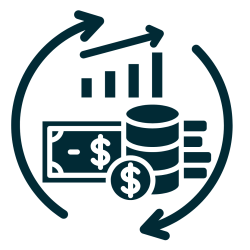Commercial real estate (CRE) investors often face challenges during an economic downturn, but with the right strategies, they can not only survive but thrive in a down market. In times of uncertainty, successful investors know how to adapt and find opportunities that others might overlook. These five proven strategies will help CRE investors maintain profitability and build long-term success even in challenging market conditions.
Step-by-Step Strategies for CRE Investors in a Down Market

Focus on Value-Add Properties
In a downturn, value-add properties present the best opportunities for CRE investors. These are properties that require improvements or renovations to increase their market value. By upgrading existing assets, you can generate higher rents or increase the property’s resale value, even when the market is weak.
Diversify Your Portfolio
Diversification is crucial for any investor, especially in a down market. Rather than focusing on one type of property or geographic location, spread your investments across different asset classes, such as retail, industrial, and multifamily, or explore secondary and tertiary markets. This reduces risk and increases the potential for consistent returns.


Build Strong Relationships with Tenants
Tenants are the backbone of your commercial real estate business, and during tough times, it’s more important than ever to maintain strong tenant relationships. Work on offering flexible lease terms, rent concessions, or support for tenants who may be struggling. A proactive approach can help you retain tenants and maintain stable cash flow.
Leverage Distressed Property Opportunities
During economic downturns, more distressed properties become available as owners face financial difficulties. These properties can offer significant discounts for savvy CRE investors willing to take on the risks. Look for foreclosed properties or those with motivated sellers to capitalize on potential upside once the market rebounds.


Maintain Cash Flow and Financial Discipline
In a down market, managing your cash flow and keeping a close eye on your financials is critical. Focus on maintaining a positive cash flow by carefully managing expenses and securing longer-term leases where possible. Maintain a strong financial position to ensure you can weather the storm and make opportunistic investments when the market recovers.

Focus on Value-Add Properties
In a downturn, value-add properties present the best opportunities for CRE investors. These are properties that require improvements or renovations to increase their market value. By upgrading existing assets, you can generate higher rents or increase the property’s resale value, even when the market is weak.

Diversify Your Portfolio
Diversification is crucial for any investor, especially in a down market. Rather than focusing on one type of property or geographic location, spread your investments across different asset classes, such as retail, industrial, and multifamily, or explore secondary and tertiary markets. This reduces risk and increases the potential for consistent returns.

Build Strong Relationships with Tenants
Tenants are the backbone of your commercial real estate business, and during tough times, it’s more important than ever to maintain strong tenant relationships. Work on offering flexible lease terms, rent concessions, or support for tenants who may be struggling. A proactive approach can help you retain tenants and maintain stable cash flow.

Leverage Distressed Property Opportunities
During economic downturns, more distressed properties become available as owners face financial difficulties. These properties can offer significant discounts for savvy CRE investors willing to take on the risks. Look for foreclosed properties or those with motivated sellers to capitalize on potential upside once the market rebounds.

Maintain Cash Flow and Financial Discipline
In a down market, managing your cash flow and keeping a close eye on your financials is critical. Focus on maintaining a positive cash flow by carefully managing expenses and securing longer-term leases where possible. Maintain a strong financial position to ensure you can weather the storm and make opportunistic investments when the market recovers.




